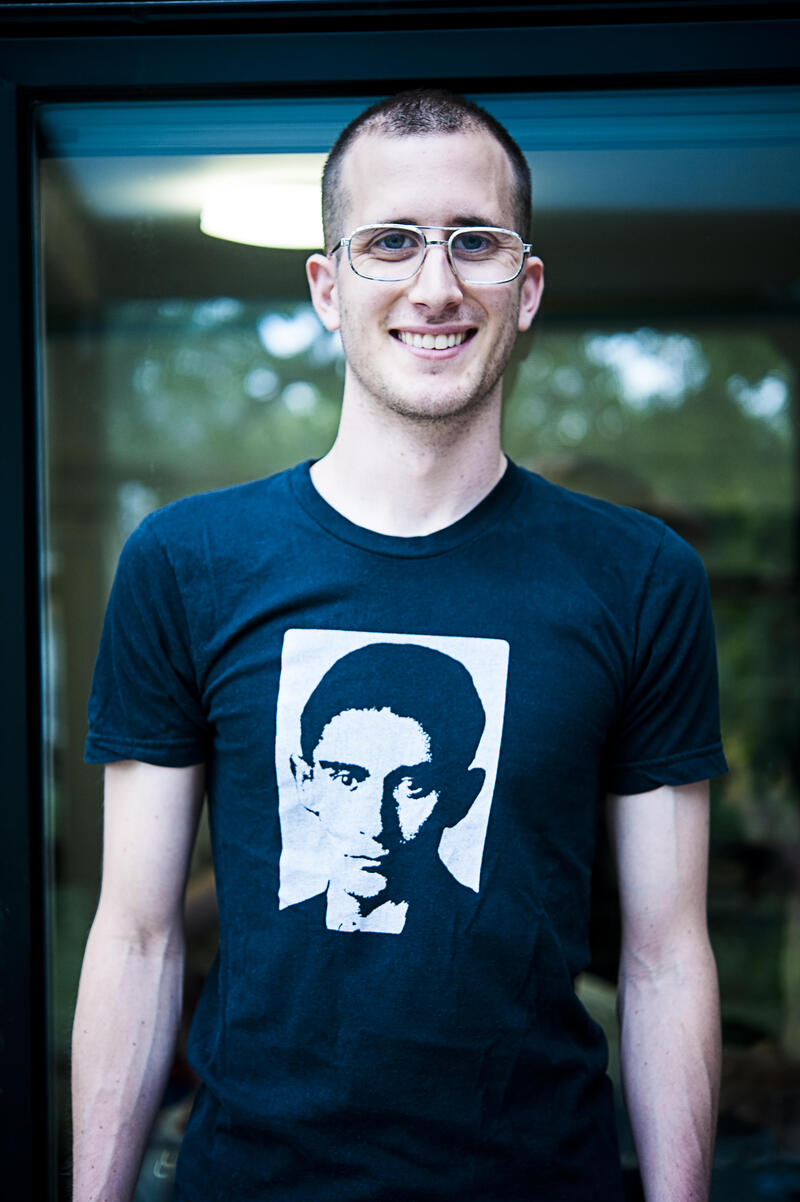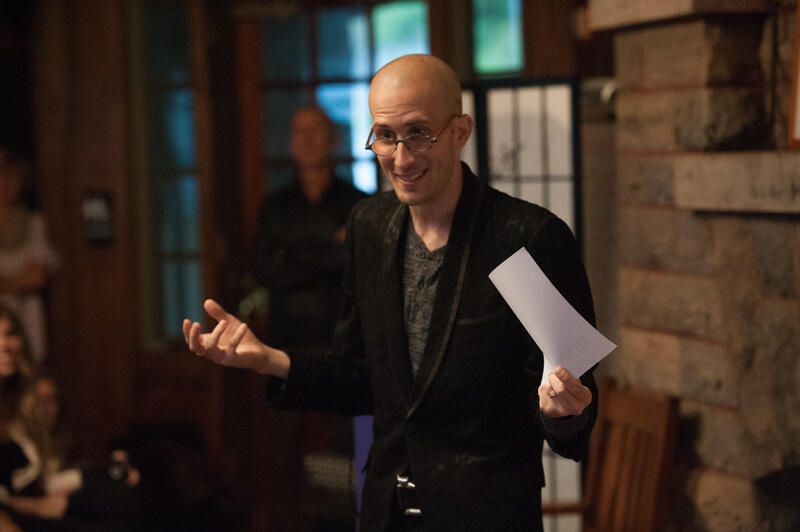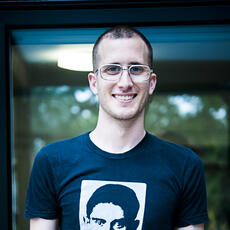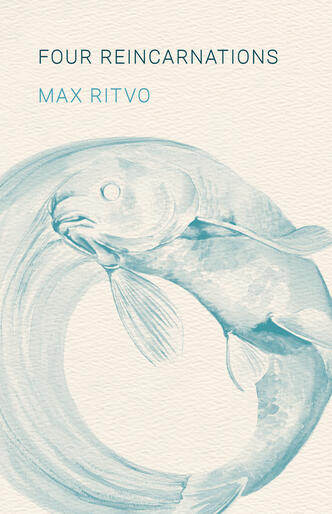Many Maxes: Performance as Legacy and an Invitation for You
Essay by Elizabeth Metzger

The night we met in Dorothea Lasky’s workshop at Columbia, Max Ritvo and I shared a taxi across the park where we were both living. I had recognized Max’s genius in the classroom, but it wasn’t until the cab ride after that I learned two defining things about Max: He was a performer by nature, and he was dying. I remember having trouble reconciling my impressions of him as an ebullient, whimsical life force breaking into song, holding my eyes on his for dramatically long spells with my understanding of the cold, lucid facts of his cancer (which had recently returned after four years in remission). As our friendship accelerated and intensified, in part due to Max’s sense of writing against time, it became clear that performance was Max’s way of reconciling his life drive with his illness, his love of people with his fear of leaving them behind.
For Max, performance was not counter to authenticity but a medium for intimacy—every space was a theater and every person was an audience. In that first cab Max had said, “People are more important than books.” I disagreed, but what was more stunning was the intensity with which Max hoped to persuade me. “I don’t read much,” he said, “I’d rather have a conversation any day.” But he did read, widely and deeply. It’s just that what mattered to him about reading was not the knowledge he privately kept but the experience of sharing that experience, reading aloud to someone else, braiding what he learned into his conversations. From Freud to improv, politics to diamonds, flowers to philosophy and every subreddit in between, Max loved making shocking connections, breaking boundaries of all kinds. Max was often testing the limits of existence, seeing how much he could exist for and as another before he was forced to take his exit.
Max composed many poems on his turquoise Macbook in cabs heading west to Columbia, then performed them for me in the cabs we shared back east. When Max first read me a poem from his chapbook Aeons, his volume and gesticulations made me uneasy. I assumed the driver was bothered or at least, distracted. When Max enacted an explosion of hotdog waters, the kind of image I had never before read in a poem, let alone heard brought to life, the driver exploded into laughter he abruptly tried to stifle. Max was so thrilled by the driver’s natural response to the humor in the poem that he encouraged him to offer critical feedback on another poem. In this impromptu workshop, the driver saw Max as an interesting passenger saying something entertaining about life rather than as poet reading a poem. At the end of the ride, as we exited the tunnel, Max told the driver he was dying. Though the driver would never have seen Max again anyway, having made the driver laugh before making him sad captures everything that mattered to Max about legacy. Max made himself human through performance first.
For Max, performance was a lot like meditation, opening his mind for connection and meaningfulness while increasing his own tolerance of the absurd and unknowable. On stage, too, Max loved turning the table and breaking the fourth wall. One of his most memorable performances was at the Poetry Society of America’s chapbook award ceremony. The auditorium of the 4th Street Theatre was so full that many audience members had to gather across the stage at the foot of the judges and winners who sat on chairs behind the microphone stand. When it was Max’s turn to read, he moved the microphone stand away, wanting no barrier between himself and the audience. Instead he performed human surround sound: In an effort to engage those behind him, Max spun in slow circles, his magenta shibori kimono glinting and leather satchel quietly flapping as he projected.

I didn’t consider until after Max died in August 2016 that “perform” means “to complete.” It is not that Max’s poems are most final when he performed them but that each performance was an opportunity for a more immediate form, a truer ending, a slightly revised version of his meaning. Every day was an opportunity for Max to be a slightly different Max. Every time I saw him I felt I was reading him anew. Some days he could plan a domestic future. Some days he told wild jokes as if he was already posthumous. “Pretend it’s a piece of performance art,” Max texted me when he had me order food for him and his friend before showing up an hour late to the restaurant.
Max hated the idea of poems confined to the coffin of a page when they could be animated by a voice in a body. When I had to record a poem of mine for a magazine, Max insisted on helping me prepare, and while I expected him to help me slow down and articulate, what he actually did was offer enigmatic cues to help me reach the emotional source I had forgotten: “Here, with a philosopher’s bitterness,” or, “Now become the rabbit.” I thought the poem would end up sounding like a bad imitation of Max, but I have never felt more myself reading.
When Max considered his literary legacy, he imagined his poems as surrogate brains, not records of his experience, but neural sheet music, a way to help people be more themselves in their own realities by trying on his thinking cap. For the fifth anniversary of his death today, August 23, I invite all of you to read and perform Max’s words, to offer them new life in our changed world. I have asked a handful of readers (some personally acquainted with Max, many not) to help me launch an inclusive cascade of voices reading Max on Instagram, @max_ritvo_readings. In the same way Max’s performative spirit emerged in the most ordinary places and at the most unexpected times, I hope these readings will bring Max’s poems to a wider audience and help us stay connected to Max’s spirit and to each other. In “Poem to my Litter,” from his debut collection of poems Four Reincarnations, Max writes “I hope, Maxes, some good in you is of me.” Max would be so honored to know we are performing his words still, that we are his many Maxes, revitalizing the world we are returning to with his poems as a guide.
I invite you to follow @max_ritvo_readings and enthusiastically hope you will share a recording of yourself reading a Max poem via your own platforms and celebrate Max’s poetry and love of performance the “Max” way. Ping @max_ritvo_readings and @milkweed_books so we can spread Max’s words and your voices!


